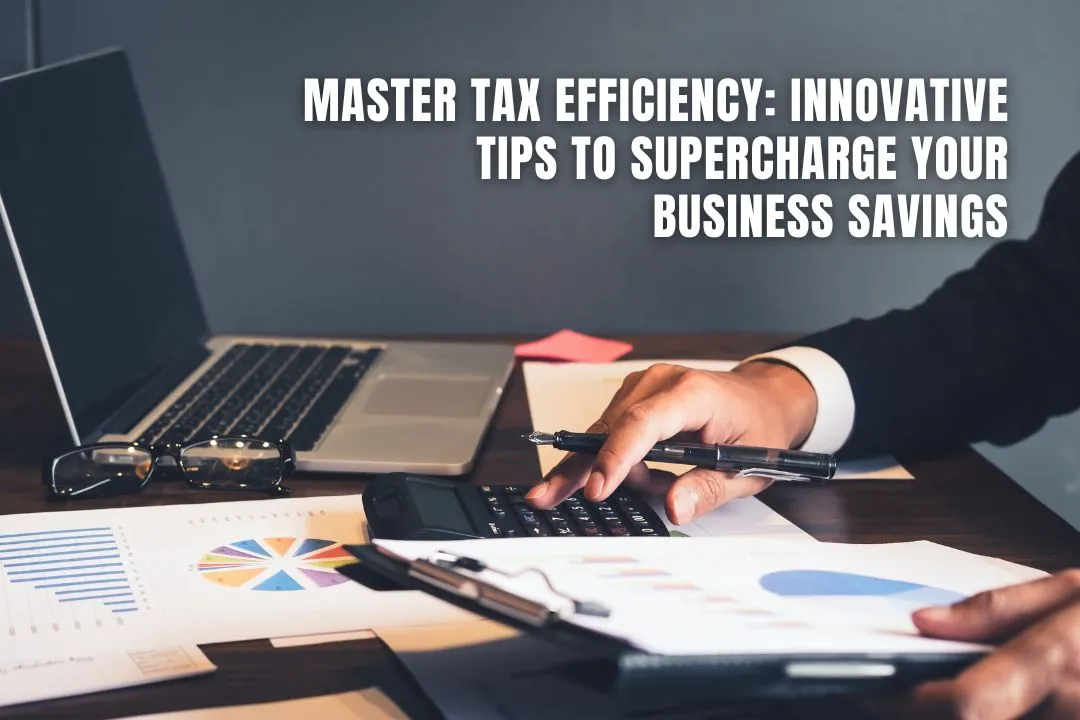Master Tax Efficiency: Innovative Tips to Supercharge Your Business Savings
September 24, 2024

Running a successful business requires more than just focusing on sales and growth. It is also essential to manage your expenses effectively. One area where companies can see significant savings is through optimizing tax efficiency. However, navigating the complex world of taxes can be challenging, especially for those unfamiliar with the details. That's why understanding how to make your business more tax-efficient can greatly impact your bottom line.
In this article, we'll discuss practical tips for improving your business's tax efficiency, ensuring that you keep more of your hard-earned money. Whether you run a small business or a multinational company, these methods can be applied to businesses of all sizes. So, keep on reading to the end!
Key Takeaways on Mastering Tax Efficiency and Savings
- Maximize tax deductions: Take advantage of common and lesser-known deductions like office supplies, employee benefits, and energy-efficient improvements to boost savings.
- Optimize your business structure: The structure of your business (LLC, corporation, etc.) directly affects your tax burden. Reevaluate your setup as your business grows.
- Hire tax professionals for complex situations: For growing businesses, outsourcing tax management to experts ensures compliance, reduces errors, and optimises tax planning.
- Leverage tax credits: Utilize tax credits for investments in research, hiring, or energy efficiency, as they reduce your tax liability dollar for dollar.
- Contribute to retirement plans: Retirement plan contributions are tax-deductible and benefit both owners and employees, reducing taxable income while improving job satisfaction.
- Keep detailed records: Accurate record-keeping is key to claiming all eligible deductions and tax credits, ensuring your business maximises its tax efficiency.
- Plan for long-term tax efficiency: Proactive tax strategies such as regularly reviewing business structures and exploring new credits can lead to sustained financial savings.
Register Your LLC
Company Registration
START NOWLeverage Tax Deductions for Maximum Savings
Maximizing tax deductions is one of the most effective ways to improve your business's tax efficiency. Many business owners miss out on valuable savings simply because they aren't aware of all the deductions they're eligible for.
Some common deductible expenses include:
- Office Supplies
- Employee Benefits
- Marketing Costs
- Vehicle and Home Office Expenses
Beyond the usual deductions, there are lesser-known ones you qualify for, such as energy-efficient improvements or continuing education for employees. Being thorough with your record-keeping will help you take full advantage of all available deductions, saving your business money in the long run.
Optimize Business Structure for Tax Efficiency
The structure of your business can have a significant impact on how much tax you pay. Whether you're operating as a sole proprietor, a partnership, or a corporation, each type has different tax implications.
For example, corporations typically face double taxation, which means the company pays taxes on its profits, and the shareholders pay taxes on dividends. On the other hand, a sole proprietorship or an LLC allows profits to pass through to the owner's personal tax return, avoiding double taxation.
It's important to evaluate your business structure as your company grows. The structure that worked when you first started may be less tax-efficient as your business expands. It may make sense to transition from one form to another to reduce your tax burden.
Hire Professionals for Complex Tax Situations
Managing your business taxes can become overwhelming, especially as your business grows and the tax code becomes more complex. If you're unsure how to handle your taxes or have found yourself in a difficult situation, it's often worth hiring professionals like Creative Tax Solutions to assist you. These professionals specialize in handling everything from tax planning and compliance to resolving issues with the IRS.
In fact, professionals provide services such as tax debt investigation and resolution, which can help businesses regain control over their tax situation. By outsourcing your tax management to experts, you'll reduce the risk of costly errors and ensure that your business remains compliant with tax laws.
Utilize Tax Credits for Business Growth
While deductions reduce the amount of income that is subject to tax, tax credits directly reduce the amount of tax you owe. Governments often offer tax credits to encourage businesses to invest in areas like research and development or clean energy. These credits can be a powerful way to lower your tax bill while simultaneously supporting the growth of your business.
For instance, if your company invests in new technologies or research to develop products, you might qualify for a research and development (R&D) tax credit. There are also credits for hiring certain employees, such as veterans or individuals from disadvantaged backgrounds. The best part about tax credits is that they reduce your tax liability dollar for dollar. Make sure to explore what credits your business may qualify for, and consider adjusting your investments to take advantage of available credits.
Take Advantage of Retirement Plan Contributions
Another effective way to improve your tax efficiency is by contributing to retirement plans, both for yourself and your employees. Contributions to retirement accounts, such as a 401(k) or an IRA, are tax-deductible, meaning they lower your taxable income for the year. Not only do these contributions offer immediate tax savings, but they also help you plan for long-term financial security.
For business owners, offering a retirement plan can also greatly benefit employees, as it helps with retention and overall job satisfaction. Additionally, employer contributions to employee retirement accounts are tax-deductible. This creates a win-win situation: you reduce your tax liability while providing a valuable benefit to your team. Make sure to explore the retirement plan options that are best suited to your business and consider contributing the maximum amount allowed by law for the best tax advantage.
Conclusion
We hope you now understand how to maximize your business's tax efficiency through smart strategies. So, apply these tips to optimize your deductions, reduce your tax burden, and see the positive impact on your savings.

